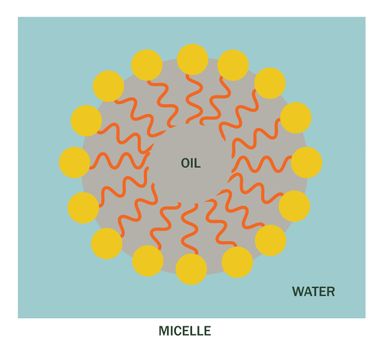Soap 101: The Ultimate Guide to Soap and Hand Hygiene
Hand hygiene is very important. Proper handwashing prevents the spread of germs and the outbreak of diseases. But with proper handwashing comes with choosing the right soap to clean your hands. There are so many soaps in different forms and sizes that will cater to different organisations, facilities and the people who will be using it. Facility managers and business owners must think of their end goal when choosing the soap for their business. Will it be all about cost-saving, ease of function or is it all about the feeling and reputation it will emulate?
First, let us get to the basic.
How does soap clean our hands?
Bacteria are everywhere. Whenever we touch something or hold something, it is guaranteed that we will pick up these bacteria through our hands. Since our skin has natural oils, the oil will attract dirt and bacteria will stick to it until they can do their damage (to you or to someone else). To keep these bacteria at bay, it is recommended that you wash your hands with soap and water. This is where soap comes into play.
Taking a look at a soap molecule
To explain it in simplest terms, if we are to magnify a soap molecule (illustration below), the soap molecule has two ends - a head and a tail. - the head part loves water (hydrophilic) and the tail part hates water (hydrophobic).

The dirt and bacteria that are stuck to the oil (illustration below) will stick to the hydrophobic end of the soap (the end that hates water) while the water molecule will stick to the hydrophilic end of the soap (the end that loves water). In a watery soapy environment, these soap molecules will arrange themselves in a cluster form called “micelles”. The tail part with the dirt and bacteria is tucked inside. When you wash your hands after scrubbing, the trapped dirt and bacteria is rinsed away with the soap.
Getting the right amount of soap, properly scrubbing your hands and the amount of time you spend washing your hands' matter. You must get enough soap to cover the surface of your hands. The mechanical act of scrubbing your hands to bring the soap to all parts of your hands will help in binding the dirt and bacteria to the soap. Properly rinsing it will be your final act of removing the dirt away off your hands.
What is the best soap for my business or facility?
There is no one soap that fits all. You have to know the type of facility that you run and the type of customers that you cater for.
What are the questions you can ask when choosing a soap for your business?
- Do you have a small or large customer base? Do you run a public or private toilets? Is having a feel-good impression important to your business, customers or visitors? Is using an environmentally friendly soap a requirement?
- Do you run a restaurant or a food service business? You need a soap in your kitchen that is effective, food-safe, and gentle for the skin due to frequent hand washing. If you have a toilet for your customers, you need a soap that will leave a good impression on your customers. A soap with perfume and moisturising abilities is a great choice.
- Do you run a daycare centre? Kids are always getting their hands dirty and they easily get sick. You need a soap that is effective and also mild on their skin.
- Do you run a shopping centre? You may need a cost-effective soap for your high traffic washrooms that will also leave a good impression but still help you with costs.
- Do you run a panel beater or a manufacturing workshop where you deal with oil, grease and ink regularly? A grit hand cleaner might be the best option.
What is the difference between liquid soap and foam soap?
Foam soap is liquid soap that has air injected into it using a special dispenser that makes a foam out of it.
Which is more effective in removing bacteria - liquid or foam soap?
An experiment was done, as published in Science Direct and in American Journal of Infection Control, comparing liquid and foam soap and their ability to remove bacteria. It concluded that foam soap is less effective in removing bacterial load as compared to liquid soap due to foam soap having less amount of soap dispensed for every pump! The most important thing to remember is that you cover your hands with enough soap and properly wash your hands to make sure you are doing hand washing the right way!
Which is more cost-effective - liquid or foam soap?
With foam soap, you get this big lather on your hand due to the injected air but you are actually using less liquid than normal liquid soap. It looks and feels like you are using more soap but you don’t. This is why some prefer foam soap because you get more dosage out of it, therefore, it is more cost-effective in the long run. Foam soap also comes out as a lather form so you don’t have to use water to lather up as compared to liquid soaps. So there are also savings on the usage of water. Foam soap comes out as pre lathered so it cuts down the hand washing time.
Which spillage is easier to clean - liquid soap or foam soap?
A lot of cleaners prefer foam soap than liquid soap because it is easier to clean its drips and spillage.
FACTS ABOUT HANDWASHING
Handwashing is really important. It is one of the things that people can do to help reduce the transfer of bacteria from one person to another. To make sure we are doing it right, we tackle some facts about handwashing.
Fact Number 1: The amount of time you spend on washing your hands matters! We are always in a rush when washing our hands. To effectively remove germs from your hands, you must scrub your hands with soap for at least 20 seconds. The common suggestion is to sing “Happy Birthday” song twice.
Fact Number Two: Temperature of the water does not matter. There is no hard scientific evidence that the temperature of the water affects the effectivity of hand washing. Whether the water is cold, warm or hot, it is best you use clean water, good soap and you wash your hands properly.
Fact Number Three: Paper towels are the best way to dry off hands not hand dryers. According to Infection Control Today, hand dryers can spread the bacteria affecting other users. Paper towels can help remove the bacteria and can help contain it.
Fact Number Four: Hand sanitizers are good alternatives to soap. According to CDC, if soap is not readily available and if your hands are not visibly dirty or you do not require to do some high-risk job (for example in health care settings), then you can use alcohol-based hand sanitizers (with at least 60% alcohol). Hand sanitizers can also effectively remove germs but not all of it. Read our article about hand sanitizers for more information.
Fact Number Five: Antibacterial soap does not mean they are better at removing bacteria. According to Center For Disease Control and Prevention, studies have shown that there is no added benefit for consumers (not including the professional in the healthcare industry) in using antibacterial hand soap versus plain soap.
Fact Number Six: Soap helps get rid of bacteria not by killing them. Soap acts as an agent or a carrier to get rid of bacteria. With the help of your hand scrubbing (the mechanical action of your hand), the time you put into properly scrubbing your hands, and clean water will help you get rid and wash the bacteria off your hands. Soap does not kill bacteria once it comes into contact with your hands.
Fact Number Seven: You still need to wash your hands before and after wearing gloves. If you are working in the foodservice industry, the healthcare industry or if your job requires wearing gloves, do not assume that your hands are clean if you are wearing gloves. If the gloves are punctured, bacteria can easily go through. If you are removing your gloves, it is common that your hands can get contaminated as well.
If you have more questions about hand soaps, hand washing and hand hygiene, do not hesitate to contact one of our Green Rhino Hygiene Experts or email us at sales@greenrhino.co.nz
Disclaimer: The articles are written with the best intentions but are of a general nature only for users who accept full responsibility for its use. Where advice is sought for specific requirements then the advice from a Professional consultant would be required. We do not make any warranties about the completeness, reliability and accuracy of the articles. Any action you take upon the information from this blog is strictly at your own risk. We will not be held liable for any losses and damages (whether direct or consequential) in connection with the use of this blog. We suggest that you seek professional advice to obtain solutions specific to your cleaning needs.


